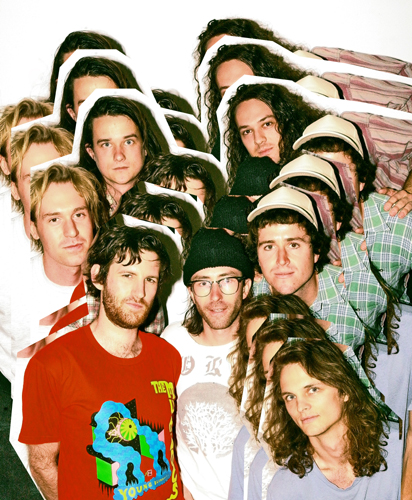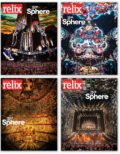
After following up their proper U.S. debut at New York City’s CMJ music marathon in 2014 with a two-album effort the following year, Australian psych rockers King Gizzard and the Lizard Wizard returned last month with Nonagon Infinity, a fuzzed-out explosion that serves as almost the exact opposite of last year’s all-acoustic Paper Mâché Dream Balloon. Frontman Stu Mackenzie recently talked with us about the extra-long process of bringing Nonagon Infinity to life, their introduction to the music scene in the U.S. and their budding relationship with Brooklyn’s Daptone Records, where they recorded the new album.
Your new album, Nonagon Infinity was in the works even before Paper Mâché came out, right?
It was kind of in the works before (2015’s) Quarters came out too, which was the one before that. I mean, this one took a bit longer to piece together. The record before that, (2014’s) I’m In Your Mind Fuzz, is probably the most similar record we made, and I guess this one we started conceptualizing straight off of that one. I suppose it flows on from that one a little bit. It was supposed to be the next record after that, but it just didn’t really feel like it was ready, and we wanted to explore some other ideas along the way and let this one brew.
These were songs we’ve been playing live for a long time now. They felt like they were songs that needed to be played, to be worked out. Whereas with Quarters and Paper Mâché, that was sort of the opposite—they felt like songs that needed to be rehearsed in a bedroom as opposed to on a stage.
These songs definitely seem a lot heavier than the stuff on Paper Mâché. Do you think they’ve changed in that timespan with you guys playing them live?
Definitely. We did some recordings for quite a few of the songs—it must have been eight months ago now—that were very different to how they ended out. I think that was part of the reason why we kept pushing it back. We’re listening back to these recordings we’ve done of these tunes and thinking: These aren’t quite there yet; they need some more thought.
How do you think that elongated process changed the way you thought about the songs?
With this record, I wanted [the songs] to be the seven of us playing together as a band. I know that sounds normal and obvious, but that’s not really how we’ve recorded very much in the past. It’s usually one or two of us who do everything and experiment in the studio with different stuff or at a home studio. Part of the concept, at least for us, was to work out tracks which felt good with everyone playing and everyone figuring out their parts on the fly. I suppose that’s kind of normal for most groups but it wasn’t for us. We wanted to let the songs evolve and take their own shape. Also, with this record, with parts of the songs—little motifs and stuff—coming in and out of different tracks and sampling each other, that all slowly evolved in a live sense, too—just improvising on one track and all of a sudden it’s turning into a different track. It was by far the slowest evolution of a record we’ve ever made.
I was going to ask, have you ever taken this long for one single album?
No, not this long. We took longer with I’m In Your Mind Fuzz, too, and we made Oddments, the record before that, while we were making that one, in a similar way. With this one we made two records in between. This one is the longest in the making for sure.
With everyone putting in their ideas in the development of the songs, do you think this is more of a collaborative band effort then you’ve had before?
In some senses, yes, for sure. In the sense that, with this record, there wasn’t anyone saying, “Don’t play that, play this” or “I’ve written the drum part and I’ve written the bass part; here it is.” It’s more like, “Here’s the rough idea, here’s the vibe. It’s in this key and it’s got these notes, here are some of the words—everyone go nuts.”
What is the usual writing process for you guys—one person bringing in a song and everyone adding in to that general idea?
It’s been different for different records. With Nonagon, all the initial ideas were mine, but they completely ended up so different from how I originally envisioned them. With a record like Paper Mâché, Joe [Walker] wrote two tracks, Cook [Craig] wrote one track, Ambrose [Kenny Smith] and I wrote a track together and the rest were my songs. There were collaborations on all the songs, really. With that record, for quite a few of the songs, there’s only one or two people on it playing everything. Whereas this one, they were my initial ideas, but I deliberately kept it pretty vague and very, very open.
You definitely a lot these days about one guy being in a band and playing the entire album himself and then figuring out how to do that on the road with other people.
There always has been that element to our band. There’s been a lot of tracks over the years that I’ve just played everything on, or maybe Cav [Michael Cavanagh] has played the drums and I’ve sort of played everything else. It’s so awesome to have five of the people in the band being pretty amazing songwriters. There’s a lot of heads to bounce off. You can throw ideas lots of different ways, and they’ll catch it and take it into different directions. The collaboration process is the best—it’s what makes music have the magical communication that you can’t achieve regularly.
In an earlier interview with us, you referred to Paper Mâché as an anti-concept album. Do you think Nonagon Infinity is more of a concept album? Do you think these songs flow together and have general themes?
To me, definitely. I probably said that while we were working on Nonagon Infinity and having my mind being melted by trying to do this record. Paper Mâché was, by contrast, enjoyable and pain-free to make. With Paper Mâché, there still were overall themes, but we wanted to be acoustic and experiment with different instruments. We deliberately didn’t want to have long, proggy songs. We didn’t want the songs to have connecting themes, for this song to be about this other song. That’s because we were working on Nonagon Infinity, which had all of these ideas tapped into it. We wanted to keep brewing, but we wanted to make a record which didn’t interfere with it. I think [with] the concept for Paper Mâché, we came up with too much, so we said, “What’s the most opposite thing we can do to Nonagon Infinity so there’s no cross pollination of ideas?” It’s separate—that’s where it came from.


No Comments comments associated with this post